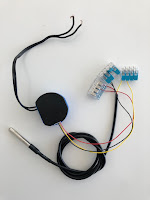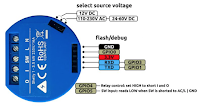November 09, 2024
Shelly devices as "native" Apple HomeKit accessories
May 03, 2023
Shelly PLUS 1 quick install
Updated 2023-05-03 !
In a former post I made a writing about Shelly 1(S1) and this post will handle about the successor Shelly PLUS 1(SP1) but much of the content is also valid for some of Shellys other devices which uses the same software/API.
To keep it simple, SP1 is a WiFi switch, 16 Amps, with dry contacts but compared to the S1 the hardware and the software is updated.
The function "without Internet" + that the SP1 can use a 12V DC source makes it perfect for an "use case" in a boat/mobile home.
May 04, 2023
Shelly 1 quick install

Setup for the later version, Shelly Plus 1, is found here !!
S1 is a WiFi switch, 16 Amps, with dry contacts and the function "without Internet" + that the S1 can use a 12V DC source makes it perfect for an "use case" in a boat/mobile home.
It's compatible with Alexa, Google or HomeKit using HomeBridge or as a "native" HomeKit device using Mongoose firmware(Flashed via a standard WEB browser !)
May 01, 2023
HomeKit bridge with Shelly/Shelly 1
 Updated 2023-05-01 !
Updated 2023-05-01 !HomeBridge is used for this setup and to make it appear in the Apple Home app.
The main advantage with the Shelly devices are that they are WiFi enabled and therefore You don't have to use a hub, this compared to z-way/zigbee and some other solutions.
First install Shelly1(S1).
March 13, 2021
SignalK switch with NodeRed and WilhelmSK
- Shelly 1 as the hardware switch
- NodeRed as the function engine
- NodeRed dashboard as input/output interface
- WilhelmSK as input/output, check picture
- A http endpoint as state sensing
November 19, 2024
Matter bridge, with Shelly, or non Matter devices
Matter is a smart home standard currently being developed by a consortium of over two hundred companies, including big players such as Apple, Google, Phillips, Amazon and Samsung.
Many new devices have Matter implemented, from the beginning, but devices, such as most of Shelly devices don't. On the other hand many hubs can be upgraded to Matter support. For example an Apple TV.
August 10, 2023
Optimizing your energy, electricity, bill. NodeRed !
July 07, 2020
SignalK, measuring temperature II

A very easy way to measure temperatures with SK is to use one wire (1W) DS18B20 (DS)temperature sensors.
August 24, 2021
Ring doorbell install and relay
- Internal doorbells
- No internal doorbell but charging the battery
- External relay, triggering "anything"
- Wireless relay
November 06, 2023
NMEA WiFi gateway

|
I have searched for a solution transmitting the NMEA data, from the
navigation network, via WiFi, to for example iSailor or other Tablet/Phone applications.
Most of these applications just accepts NMEA0183(N1) but many boats are also using SeaTalk 1(ST1) and NMEA2000(N2K).
This post will cover, kept compact, my best findings covering both a DIY
and a commercial approach to handle the different protocols.
April 02, 2020
Underfloor heating hack
 I have tried to find some basics how a standard underfloor control system is regulating the heating, but haven't, so started with checking up our own temperature control system from LK(TCS).
I have tried to find some basics how a standard underfloor control system is regulating the heating, but haven't, so started with checking up our own temperature control system from LK(TCS).I used Node-Red, with Raspberry Pi(RPi), sensing when the TCS applied voltage to the actuator. Since the actuator is running on 24 VAC and the input on a GPIO PIN is maximum 3,3 VDC I used a optocoupler to level shift. Schematics below
Please find another post here where I realized, using Shelly 1 and NodeRed, the regulating of the underfloor !!
November 21, 2024
Underfloor heating with PID controller, NodeRed

|






